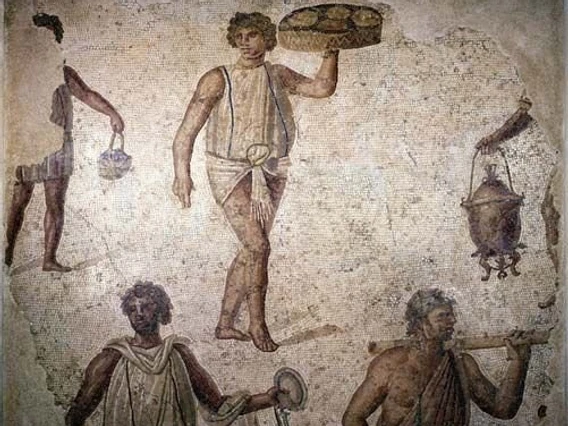
Artist’s rendition of a typical Greek city
One of the hardest things for modern readers to comprehend about the ancient world, at least in the lands covered by these stories, is the virtual absence of anything like a “government” in the modern sense of the word. Neither the Romans nor the Greeks ever created a bureaucracy of officials to oversee the daily operation of their empires, nor was there any common system of laws or a judicial system to enforce them. The Romans did appoint a governor over each of their provinces, but his role was mostly limited to adjudicating disputes and ensuring that the taxes were paid and the peace kept.
Insofar as anything like a “government” existed, it happened through the cities. This model had its roots in ancient Greece, where each city (and the territory around it) functioned like an independent state. When the Greeks moved beyond their homeland, whether by colonization or conquest, they took this model with them. In some cases they built new cities from scratch, while in other cases a city erected originally by non-Greeks would be reworked to conform to the Greek model.
The level of replication was uncanny by modern standards: every “Greek” city exhibited the same basic physical layout, contained the same array of buildings and institutions, operated by the same political and economic systems, and followed the same religious and cultural practices. Government was minimal, centering on an elected city council that was drawn increasingly from the wealthy elites.
By the time of our story, elections were mere formalities; civic life and institutions were largely controlled by wealthy families and their allies. These same families paid for most of the public buildings, entertainments, celebrations, and religious festivals that took place in the city. Their contributions to civic life were repaid in the form of public honors, which served as the primary currency of the elites. The bulk of the daily bureaucratic work was performed by slaves owned by the city. Thus when Caristanius decides in our story that Lucius should be the agoranomos of Antioch, his election is a foregone conclusion, and Lucius also knows that he can count on a battery of city slaves to handle the daily operation of the market.
The coming of the Romans made little difference to the Greek cities. The Romans nominally respected their independence, but only after ensuring that pro-Roman elites were installed in the highest civic offices. For the most part the cities continued to operate as they always had, serving as the the economic and political centers of their region under the occasional oversight of a Roman governor. The Romans also set up a small number of colonies like Antioch in key parts of their empire, primarily in places where a stronger Roman presence was believed to be necessary to maintain the peace. These colonies followed Roman laws and institutions but otherwise operated much like the Greek cities.
Outside of the cities, daily life continued for the most part as it had done for centuries, though those who lived closest to the city often had their lands confiscated by the Greek elites when a city was first erected. Greek culture was slow to permeate the countryside apart from the need for at least one member of the family to speak enough Greek to sell their produce in the city markets. Their rough and halting Greek led the city-dwellers to call them “barbarians,” a word that literally meant “babblers”–they spoke Greek like babies, not like mature adults. In time, what began as a term of linguistic derision for country-dwellers was loaded with all sorts of prejudicial associations so that “barbarian” became the standard Greek term for anyone who did not know how to think, speak, and live as an educated Greek.


